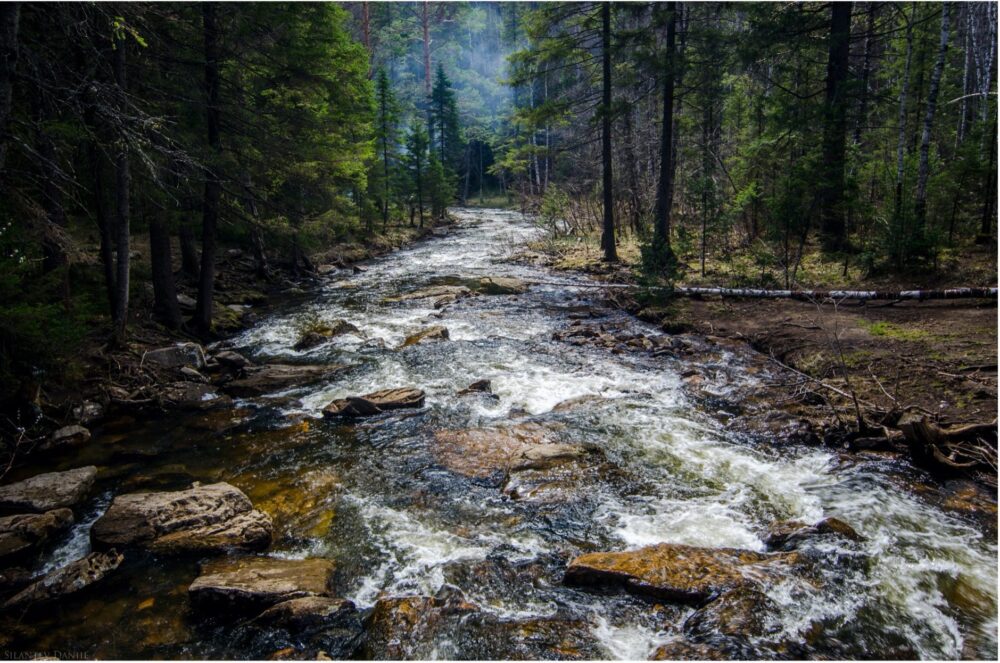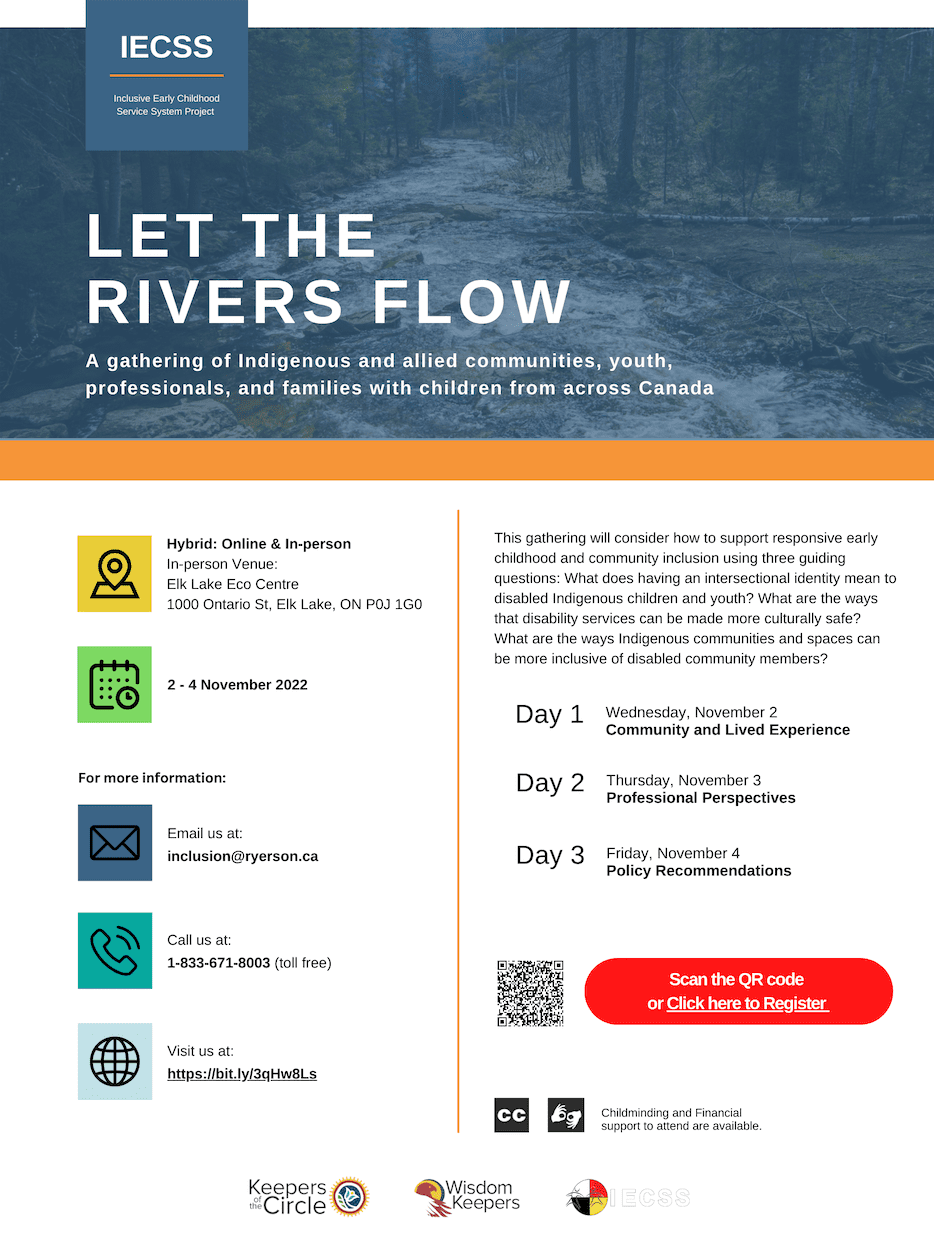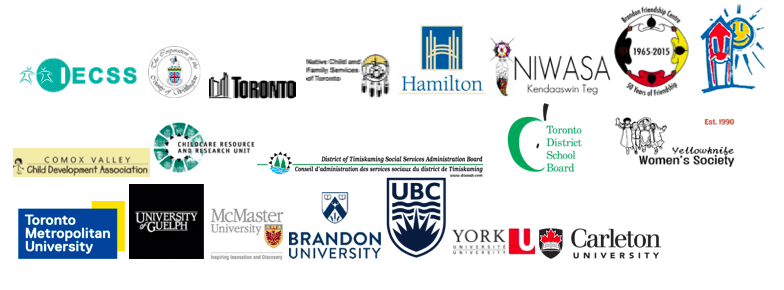Let the Rivers Flow: A Gathering about Responsive Early Childhood and Community Inclusion


Register for the gathering through eventbrite (external link)
Gathering Schedule
We are excited to announce the schedule of events for the upcoming gathering, Let the Rivers Flow. We will gather in person in Temiskaming at the invitation of the Wisdom Keepers at Keepers of the Circle.
The gathering welcomes Indigenous, disabled and allied community members to share in discussion about responsive early childhood and community inclusion. The gathering is guided by three questions:
- What does having an intersectional identity mean to disabled Indigenous children and youth?
- What are the ways that disability services can be made culturally safe?
- What are the ways Indigenous communities and spaces can be more inclusive of disabled community members?
The gathering will be in a hybrid format with people gathering in person and online. Indigenous peoples generally do not follow a strict timeline in a gathering of this nature. We will do our best to follow the timeline, in order to make it accessible for those online. We do however ask for patience as we listen to the experiences of those who are coming together to share. All presentations will be available to both in-person and online audiences.
Zoom links will be shared with those who are registered in the days before the gathering.
9:00-9:45am Opening, Keepers of the Circle Wisdom Keepers Council
9:45-11:00am Lived Experiences Panel with Regis Huston, Tyler Huff (external link) ( (PDF file) video transcript), Mike Ashkewe, Charlotte Hunter, moderated by Nan McLeod
11:00-12:15pm Parent Panel with Connie Hall, Samantha Chevrier, Tamara Chevrier (external link) ( (PDF file) video transcript), and Lorette McKnight, moderated by Dr. Kathryn Underwood
12:15-1:15pm Lunch
1:30-2:30pm Grandparent and Elder Panel (external link) with Tammy Chevrier, Philip Gliddy Sr., Marilyn Chevrier-Wills, and John Wills, moderated by Nicole Ineese-Nash
2:45-3:45pm An Indigenous Perspective to Supporting Children & Families with Disabilities and Challenges with Rona Sterling-Collins, moderated by Kaitlyn Wilcox (please contact inclusion@torontomu.ca for presentation slides)
4:00-5:00pm (PDF file) Nurturing the Young Child from Within An Indigenous Paradigm, keynote by Dr. Sharla Mskokii-Peltier moderated by Kaitlyn Wilcox
Closing Song and Prayer
9:00-10:15am Opening with the Council of Wisdom Keepers
Indigenous Theories of Disability with (PDF file) Nicole Ineese-Nash and Dr. Evelyn Kissi, moderated by Amber Holmes
10:30am-12:00 pm Community Program Perspectives (external link) (PDF file) (Q&A video transcript), moderated by Amber Holmes
- Lori Huston, Roxanne Fobister, Tammy Loon, Grassy Narrows First Nation, Ontario
- Lisa Sloan and Shyanne Polson, Keepers of the Circle, Temiskaming, Ontario
- (PDF file) Re-storying Autism and the Indigenous Approaches to Autism Partnership with Yan Chen and Patty Douglas, Brandon Friendship Centre, Manitoba
12:00-1:00pm Lunch
1:00-2:15pm Indigenous Early Childhood Programs and Assessment, moderated by Shannon Murphy
- Monique Lavallee, Niwasa Kendaaswin Teg, Hamilton, Ontario
- (PDF file) Independent First Nations: Education, Indigenous Early Childhood Programs and Assessment with Deborah Terrance, Akwesasne Mohawk Nation, Ontario and New York
2:30-3:10pm (PDF file) What's LOVE got to do with it? Parenting and Programs Centered on Responsive Care, keynote by Dr. Jessica Ball, moderated by Mia Francis
3:30-4:05pm Training and Community Programming
- Child Development Worker, with Rennais Gayle, Karen Hargreaves and Ingrid Nosal, Assiniboine College
4:05-4:45pm Keynote by Dr. Alison Gerlach, moderated by Mia Francis
Closing prayer and song
9:00-9:30am Opening
9:45-10:45am
- Oneida Sign Language: Marsha and Max Ireland
- Parent Perspective: Kendra Danielle Nisawaynoodinaawkokwe, Rama First Nation
11:00-11:45am IECSS Presentation of Research Findings and Policy Recommendations by Dr. Kathryn Underwood and Dr. Nicole Ineese-Nash
12:00pm Closing prayer and song
Policy Brief & Event Technical Report
- IECSS. (2022). (PDF file) Policy brief no. 12: Policy recommendations for inclusive early childhood services. Inclusive Early Childhood Service System project.
- Park, J., & Ceolin, K. (2023). (PDF file) Let the rivers flow: A gathering of Indigenous and allied communities, youth, professionals, and families with children from across Canada, event technical report. Inclusive Early Childhood Service System project. Toronto, ON: Toronto Metropolitan University.
Speaker Bios
Day 1: Community and Lived Experiences
Regis is a grade 10 student at University Hill high school in Vancouver. Regis loves spending time with his french bulldog Lenny, and his favorite subject is social studies with a passion for learning about his Métis ancestry and the 1800s historical period in North America.
I identify as a Disability & indigenous advocate and a freelance radio contributor across Canadian radio my website is http://www.mikeashkewe.com
My name is Mike Ashkewe but that wasn’t always the case. I was born Michael Dodd and that was my adopted name, you see, I am a 60’s scoop survivor. I was given up for adoption and raised by a non indigenous family and outside of my culture and practices. I was marginally aware of my identity for many years but still suffered racism and bullying as a result of it. I did not know of my Mother’s identity for many years and would not find my biological father til almost 40 year later.
Coming from a particularly horrifying part of Canadian history is certainly a hard thing to have over someone’s head and life but it can change things in unexpected ways. You can learn to draw strength from it and let it make you better than your circumstances. You can share your story of survival and maybe it can help others by giving them strength and hope they never had previously.
However being raised in rural small town Ontario does teach certain things that can’t be learned inside of a classroom. I quickly learned that being quick, clever and were the easiest ways to survive and adapt to a hostile environment. Artistic pursuits such as those offered by drama, creative writing would lead to a life in the creative arts. Adaptivity, creativity often go hand in hand and being able to use this to survive and thrive once I left home was something that I’ll be forever grateful for.
I am currently serving as my region’s Indigenous representative for the Guelph NDP riding association here that opened up new eyes and new drives to learn and more. My indigenous identity is something I am choosing to draw strength and courage from now on and until the end of my days. There is something that I find from the sounds of drumming,the chants of our singers and the rhythm of Pow Wow dancers.
Rona Sterling-Collins, Quist’letko from the Nłeʔkepmx Nation. Rona was raised on her ancestral land, Joeyaska First Nation in the Interior of B.C. and continues to reside there among her family. She is married and has two adult children and a three year old granddaughter. Her son Wyatt has autism, which challenged her to become an advocate for him and other Indigenous children and adults with developmental disabilities.
She has a Master’s Degree in Social Work. In 1996, she started a Consulting Business – Rona Sterling Consulting – and works as an Indigenous Consultant across the Province of B.C. Rona has had the honour of working with organizations and communities and championed many projects that promoted capacity building for Indigenous communities, organizations and
front line staff.
Rona approaches her life from a wholistic perspective and promotes this philosophy to continue to create systems of change. She is dedicated to decolonization practice that hold Indigenous children and families at the heart of her work.
Nurturing the Young Child From Within an Indigenous Paradigm
Sharla Mskokii Kwe, member at Mnjikaning (Rama) First Nation, Ontario, is an Associate Professor in the Faculty of Education, Lakehead University. Her research and teaching experiences in community and post secondary contexts are rich with storytelling, community culture land-based pedagogy and relational ideologies. Mskokii Kwe’s scholarship centers Indigenous teaching-learning practices to counter colonial harm to our family and community systems. She facilitates the honoring of the child's voice and language through oral story and inclusion.
Day 2: Professional Perspectives
Lori Huston (she/her) Métis, Mother of two, Early Childhood Educator, and currently a doctoral student in the Education, Curriculum and Pedagogy program of the University of British Columbia. Lori is from Red Lake, Treaty 3 Territory, in north-western Ontario. Lori’s cumulative research experiences and graduate studies have focused on Indigenous ECE leadership, highlighting Indigenous pedagogies connected to reconciliation, place, and land-based teachings. Lori founded a mentorship program called Rising Indigenous Voices in Early Learning in 2018, where she collaborates with over 100 Indigenous ECEs living in First Nation communities across northern Ontario.
Roxanne Fobister (she/her) Anishinaabe – Ojibway, Mother of three, Early Childhood Educator, Child and Family prevention worker within the band office in her home community of Asubpeeschoseewagong (Grassy Narrows) First Nation, Treaty 3 Territory, in north-western Ontario. Before this role, Roxanne was the Child Care Supervisor at Migizi Wazason Child Care Centre for many years. Roxanne is committed to action and change that supports and uplifts her community members.
Tammy Loon (she/her) Anishinaabe – Ojibway, Mother of 3 and a Kookum to her first grandson Tanner. Tammy is the Supervisor at Migizi Wazason Child Care Centre in her home community of Asubpeeschoseewagon (Grassy Narrows) First Nation, Treaty 3 Territory, in north-western Ontario. Tammy has provided care within the child care sector for 21 years and has been the Child Care Supervisor for the last three years. Tammy is committed to supporting healthy play and growth for the children and families in her community. Tammy is a silent Ojibway speaker; she understands her language but does not speak it.
Monique Lavallee is from Nyeashingaming Unceded First Nation in Ontario. She is an advocate for Indigenous peoples and their right to self -determination and believes that Indigenous people should have access to culturally relevant and safe services. Monique is the Executive Director of Niwasa Kendaaswin Teg, a non-profit Indigenous organization in Hamilton. Monique also serves as the President of the Ontario Aboriginal Head Start Association.
Alison has English and Welsh ancestry and moved to Turtle Island from the UK 30 years ago. She lives uninvited on the unceded territory of the Sḵwx̱wú7mesh (Squamish) Nation in BC and works in the School of Child & Youth Care at the University of Victoria on the unceded territory of the lək̓ʷəŋən peoples. Her research aims to explore and inform how the organization and
provision of pediatric and early years programs and services can be equity-oriented – that is how disability services for children can be inclusive of and responsive to families whose lived experiences include marginalization, racialization and discrimination. Alison is committed to community-engaged and critically-informed research and knowledge mobilization.
Day 3: Policy Recommendations
Kendra Danielle Nisawaynoodinaawkokwe, member at Mnjikaning (Rama) First Nation, Ontario is a Social Worker, educator, community resource and Mother. With her daughter Harper Kendra has navigated all systems related to education of an Indigenous child with special needs. Kendra develops and facilitates Indigenous community programs addressing drugs and alcohol, MMIW, Rape Culture, Indigenous family systems and Life Promotion.
Frequently Asked Questions (FAQ)
Let the Rivers Flow will be a hybrid gathering offering both in person and online options for participation. For those who are attending in person, we remind everyone that we are guests in this community. We ask that you listen respectfully, that we centre Indigenous and disabled people’s experiences. We also ask that no alcohol be consumed at the gathering, and that local community etiquette is followed (if you have questions, please ask). We have also provided a document that is an introduction to the community and people of the District of Timiskaming (https://keepersofthecircle.com/ (external link) ).
Register for the gathering at Let the Rivers Flow: Responsive Early Childhood Early Childhood and Community Inclusion (external link)
No, there is no registration fee for the gathering.
No, at this time we are no longer accepting proposals if you have not already been in conversation with a co-chair of the gathering. The Co-chairs are Niki Ineese-Nash and Kathryn Underwood.
The gathering is hybrid with both in person and online options. If you registered to attend in person, we will reach out to you with information about accommodations in the area. We have booked some accommodations already, so that we can ensure Elders and anyone traveling with children is able to stay on site. Other accommodations are available nearby.
Recommended hotels: Elk Lake Wilderness Resort (external link) , Moosehorn Motel (external link) ,
Please contact inclusion@torontomu.ca for more information.
Elk Lake Eco Centre (external link)
119 Ontario St, Elk Lake, ON, P0J 1G0
Wednesday, November 2nd, Thursday, November 3rd and Friday November 4th, 2022.
See Gathering Schedule for more details.
Please reach out as soon as possible to inclusion@torontomu.ca for any accessibility requirements you have to attend either the online or in person gathering. The gathering will have American Sign Language (ASL) interpreters (Connect Interpreting Services) and automated closed captioning for online content. Childminding will be available for in person attendees and financial support to participate in the gathering is available upon request.
When you register to attend the gathering in person an IECSS staff member will reach out to you to go over the financial supports available and address questions.
Day 1 – Breakfast, Lunch and Dinner will be provided
Day 2 – Breakfast, Lunch and Dinner will be provided
Day 3 – Breakfast, a to-go lunch will be provided
You will need to make your own travel arrangements. Elk Lake, Ontario is 600 km from Toronto. 223 km from North Bay, and 225 km from Timmins. If you need additional information, please reach out to us at inclusion@torontomu.ca.
Please note that there has been a shortage of rentals vehicles. If you are attending in person and need to rent a vehicle, we highly encourage you to book as soon as possible.
Acknowledgements
The Inclusive Early Childhood Service System (IECSS) Project is a partnership between Toronto Metropolitan University, Guelph University, McMaster University Carleton University, several municipal governments (Wellington County, City of Toronto, District of Timiskaming, City of Hamilton) and community organizations (Brandon Friendship Centre, Childcare Resource and Research Unit, Comox Valley Child Development Association, Native Child and Family Services, Niwas Kendaaswin Teg, Keepers of the Circle (Temiskaming Native Women’s Support Group), Toronto District School Board, Yellowknife Women’s Centre and Macaulay Child Development Centre).

The gathering is funded by the IECSS Project. The project is funded through a partnership between: the Corporation of the County of Wellington, District of Timiskaming Social Services Administration Board, City of Hamilton, City of Toronto, University of Guelph, Offord Centre for Child Studies and Toronto Metropolitan University, as well as through grants from Social Sciences and Humanities Research Council.



Special thanks to the gathering’s working group
- Arlene Hache – Keepers of the Circle
- Carol McBride – Keepers of the Circle
- Deborah Terrance – Independent First Nations: Ending Violence Against Indigenous Women
- Patty Douglas – Brandon University
- Shannon Murphy – Native Women’s Centre: Hamilton Chapter
- Lori Huston – Rising Indigenous Voices in Early Learning
- Mia Francis- Independent First Nations: Ending Violence Against Indigenous Women
- Lisa Sloan – Keepers of the Circle
- Judith Mintz – Native Child and Family Service’s Toronto
- Yvonne Bomberry